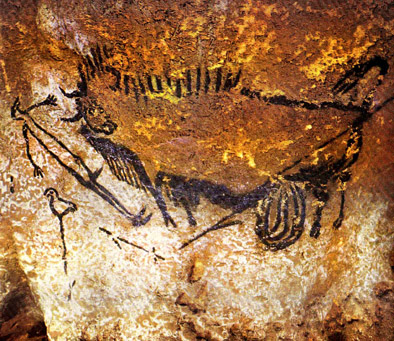We are happy and productive little worker bees, coming and going as we hum a simple tune, never deviating from our present course. We like our world, with its rules and obligations clearly set for us, where we don't have to confront greater dilemmas or search for ultimate truth. This is a world where everyone smiles, and such niceties as "Well, how are you today?" and "Oh, I'm doing well, and you?" are commonplace. We like to ignore...the darker side of life. There are times, however, when this great and terrible darkness can no longer be ignored. These are the times when we force ourselves to face everything we have abandoned, denied, and held back all of our lives. In Samuel Beckett's
Malone Dies, the reader is held captive by the written word and forced to witness the death of a man. We have no protection from the horror of this sight, and to keep the fallacy of our happy world alive, we fall back on simple niceties--dismissal and denial.
As easy as it would be to dismiss the works of Beckett as dismal, dark, and depressing, this would be a mistake. What Beckett puts forth to us is a series of revelations achieved through kenosis. This emptying out of self is demonstrated through the suffering and decay of Malone, the central character. His plight is dreadful and horrific to witness, yet we must be this witness, in order to reach a core of deeper revelation within the ever-present darkness. What Beckett offers us is the meaning within the darkness in our lives. Through this emptying of self by the witnessing of Malone's degeneration, we are, paradoxically, filled. We are reborn.
The narrative starts out simply enough, with the words, "I shall be quite dead at last in spite of all" (179). Malone seems to have accepted his fate and proposes the telling of stories to pass the time before he dies. He, very clearly delineates four stories he will tell, followed by an inventory of his belongings. This overtly practical approach to his own death only serves to tell us of how close he is to life. He clings to the way in which he has lived, where the projected image of competency and calm must be maintained at all times, despite any pain and emotion on the part of the individual. Malone's final act is the creation of stories. He clings to his ability to create as the ultimate connection to his humanity. Why?
One must consider this need to create as a need for immortality, a need for one's existence to continue, no matter how wretched. Through the arts and the act of creation, we strive to combat our mortality, living forever in the mind of another. This, at first, does not seem to be Malone's aim in the completion of this narrative. He addresses the sacred task before him as a mere game, something to entertain him as he watches his body grow weak in decay. However, as we move a little further along in this process, despite himself, Malone says, "I have time to frolic, ashore, in the brave company I have always longed for, always searched for, and which would never have me" (193). Malone, unlike his fellow man does not attempt to combat his mortality through the written word. Rather, he seeks the recognition of a witness at the end of an unwitnessed life. Alone and destitute, he uses this immense godlike power of creation to form beings, fictional as they may be, to accompany him into death.
What does it mean, then, to create a living being in the form of written word? On the first level, this creation is pure fiction and therefore open to dismissal. After all, no matter how raw and burdening a story may be, in the end, we can simply say, "That wasn't real". So we must ask ourselves, what is real? Malone creates fictional characters who are not physically living and therefore are not real. In creating others, however, Malone is creating himself, for the only record we have of him is through the written word, through his manuscript he leaves behind. Malone himself is a creation, a fictional character from the mind of Beckett. One could argue that we, the reader, are modified or created anew through the process of reading and our connection with these fictional creations. Without art and without the process of generation through art, man does not exist. Our only immortality comes in our living on in the mind of another by means of the written word, by means of the creative force of their imagination and memory. The character of Humbert Humbert in Vladimir Nobokov's
Lolita states, "And this is the only immortality you and I may share, my Lolita" (309). Humbert Humbert creates his enduring image of Lolita, knowing beyond the shadow of a doubt that man's only form of immortality is in "the refuge of art" (309).
Malone says, "I shall try and make a little creature [. . .] a little creature in my own image, no matter what I say. And seeing what a poor thing I have made, or how like myself, I shall eat it" (226). Here, parallels can be drawn to the ancient myth of Saturn devouring his children. The god who creates destroys his creations. This is hardly a new theme in the course of mankind. So, with the value of creation comes an accompanying power of destruction. The darker side of life emerges and must be recognized. Now comes the chilling thought: Malone creates these beings, gives them life through the written word, and ultimately murders them. He offers up his creations as sacrificial victims to accompany him into that ever-present darkness.
By creating the character of Lemuel who eventually murders his other creations, one could argue that Malone calls forth his own destruction, as he dies shortly after this. Lemuel, therefore, acts as a great avenging angel and agent of death. Why must his characters die, simply because Malone must die? At first, this seems a selfish act. Malone needs someone to go with him in the end, just as a small and frightened child needs a parent's reassuring hand to venture out in the darkness. Malone fears "the impending dawn. The impending dawn" (194). This dawn is the final revelation that occurs when one has succeeded in emptying oneself of self. When the man who would be the Buddha empties himself of all human experience, existing solely as an emaciated figure beneath the Bhodi tree, he finds his long-awaited enlightenment. Perhaps then the "white light" so many individuals experience as they fade into death is but the light of knowledge, or the epiphanic experience of ultimate truth. Can one ever know this truth without having passed through the darkness before it? I would argue that Malone's final act of destruction, through the body of Lemuel, is not a selfish act. Malone realizes that this eventual end, this light at the core of his suffering must be faced alone. Like a Christ figure, dismissing his disciples to wander alone in the garden of self, he goes out to meet the light at the end of his journey.
The record of Malone's plight, his exercise book, signifies not the mere setting for his wanderings, but rather the entirety of his existence. Malone implies countless times throughout this short narrative, that he has been alone in life. Even now, he dies completely alone, witnessed only by the viewer through the avenue of his words. He says, "all I ever had in this world all has been taken from me, except the exercise-book, so I cherish it, it's human" (270). When all the human dignities have been put aside, when Malone has nothing, he will still retain the one thing that makes him human, his ability to create. The exercise book itself is not only his creation but represents his life as a whole. Malone outright tells us, "This exercise-book is my life" (274). When the words run out, Malone will run out. Malone is made up of words as a fictional creation, and when the "Gurgles of outflow," the written word and his life-blood, cease to be, Malone will end (287).
From the initial words of this novel, the reader sits quietly in the room with death itself and watches, almost perversely, the destruction of a man. We are culpable participants in that by continuing our reading, we advance the story. We, the reader, are responsible for the suffering of this man. We are responsible for his inevitable demise. Our hands are far from clean in that respect. Beckett creates the experience by writing, effectively defining his readers even as he focuses on his characters. Through the act of reading, we are creating the figure of Malone; Malone then writes to create his own characters. This cycle of generation continues, unending. Even as Malone is emptied as the novel progresses, the reader is filled. We gorge ourselves on the act of creation. We fill our souls with this mortality, immortality, death, life, and light. An act of emptying, our reading, fills us up. "The render rent. My story ended I'll be living yet. Promising lag. That is the end of me. I shall say I no more" (283). Malone the individual dies, but Malone the creation, the construct, lives.
We cannot ignore the darkness in our narrative or risk losing the revelation. Not all awareness comes from darkness, but these epiphanies hit harder, last longer than those we gain unearned. These are moments in life wherein, rather than resisting the pain or sorrow, we must open ourselves up to that experience, allowing it to flay us alive. These are moments when something has to be felt, as difficult as this may be, in order that we may know ourselves. "The impending dawn" is our objective, but there cannot be a dawn and following day without the night that bears it.

















.svg/300px-Seal_of_Solomon_(Simple_Version).svg.png)


